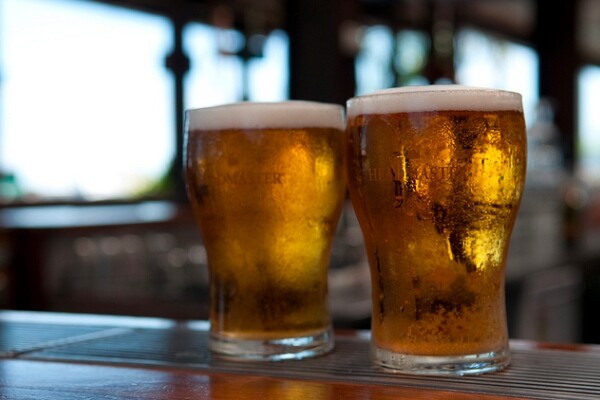Alcohol Makes Foods Smell Better, Study Says

The consumption of alcohol leads to questionable decisions. For a lot of folks -- myself included -- sometimes, those questionable decisions revolve around eating. Personally speaking, if I've had a few rounds, and there is food in front of me, then it is food that will be eaten. This is, of course, not unique.
But why does this happen? Turns out, it's because alcohol messes with our brain's response to food aromas.
A new first-of-its-kind study by researchers at Indiana University tested how alcohol affects our brains. Researchers injected one group of participants with alcohol and injected a second group with saline solution. They then offered the participants lunch, while they were hooked up to an MRI brain scan. Participants with alcohol in their system not only consumed more, but showed highly levels of activity in the hypothalamus, the area of the brain responsible for certain metabolic process.
What does all this mean? I contacted Dr. William J. A. Eiler II, the lead author on the study, in order to find out.
How did you come to research this? Why did you perform this test in the first place?
Dr. Eiler: People have known about the aperitif effect for some time; however, there has never been a consensus on what causes you to eat more after a couple of drinks. This is what we wanted to find out, what alcohol is doing to lead to this. More specifically we wanted to know if this was due to alcohol's interaction with the gut, or was the effect more neurological in nature. That is why we directly administered the alcohol intravenously, so we could bypass the digestive system and look explicitly at what it is doing to the brain.
Why does alcohol have this effect? What is going on with the brain when alcohol affects the section used for smell?
Eiler: It still remains a bit of a mystery as to how exactly alcohol is interacting with the brain's neurochemistry to produce enhanced appeal of food odors, though it is clear from our study and other similar studies, that this effect is not reliant on changes in the gut hormones that generally initiate eating. The area of the brain affected is the hypothalamus which is deep within the brain and is roughly the size of an almond. This region of the brain has been shown to play roles in both olfaction and the control of food intake. For these reasons, activation of the hypothalamus makes sense. However, much more research is needed to understand how alcohol is affecting this particular area and why that leads to an increase in the sensitivity to food odors and increased eating.
What does the heightened smell sensation lead to?
Eiler: We hypothesize that this heightened appeal of food odors leads to a person perceiving a food as more appetizing in general and are, therefore, compelled to eat more of it. It really boils down to our perception of how enjoyable that food would be to eat.
Are there specific foods that are more desirable after ingesting alcohol?
Eiler: While it is possible that some foods may be more desirable than others following a couple of drinks, I can't really say based on the research we conducted. Given what we know from this study that alcohol heightens the appealing characteristics of food aromas, it may be possible that foods that are typically more aromatic might be craved more than others that have less of an aroma. But at this point, that is just conjecture.
Is there a threshold for the amount (or type) of alcohol consumed? Would one drink accomplish the same as four?
Eiler: That is another good question and one that will have to be answered by further research. In our study, we maintained all our subjects at a breath alcohol concentration of 0.05% which is equivalent to a couple of glasses of wine. I would hazard to say that there is likely a "sweet spot" where drinking before a meal increases you consumption with too little having no affect and too much leading to a decrease in eating. Again, this would need to be investigated in the future where the amount of alcohol is varied.